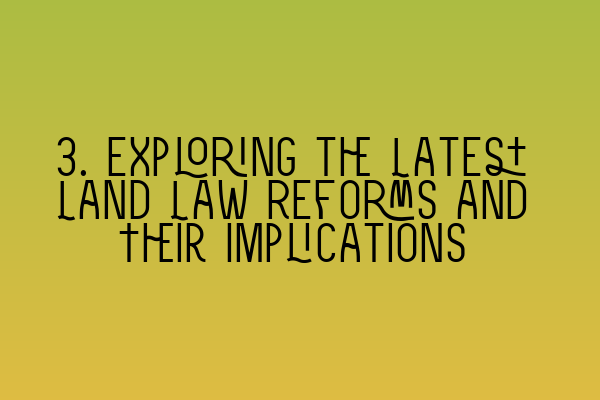Welcome to our latest blog post on land law reforms. In this article, we will explore the recent changes in land law and their implications. Whether you are a solicitor, property developer, or simply interested in understanding the current landscape of land law, this post will provide you with valuable insights.
1. The Land Registration Act 2002
One of the most significant land law reforms in recent years is the implementation of the Land Registration Act 2002. This legislation revolutionized the way land ownership is registered and protected in England and Wales. It replaced the outdated system of paper-based deeds with an electronic system, making the process more efficient and transparent.
The Land Registration Act 2002 aims to simplify the land registration process and provide clear and conclusive evidence of ownership. It establishes a priority system, ensuring that the first registered owner takes precedence over subsequent claims. This has greatly reduced the scope for disputes and has brought greater certainty to property transactions.
If you want to learn more about the Land Registration Act 2002 and its impact on property law, you can check out our SQE 1 Practice Exam Questions and SQE 1 Practice Mocks FLK1 FLK2 articles.
2. The Housing and Planning Act 2016
Another recent land law reform that has significant implications is the Housing and Planning Act 2016. This legislation was introduced to address the housing crisis in the UK by promoting the construction of new homes and streamlining the planning process.
The Housing and Planning Act 2016 introduced measures to streamline and accelerate the planning process, making it easier for developers to obtain planning permission for new housing projects. It also implemented measures to encourage the efficient use of land, such as enabling the conversion of commercial properties into residential ones.
If you are involved in property development or interested in learning more about the Housing and Planning Act 2016, our SQE 2 Preparation Courses offer comprehensive guidance on the legislation.
3. The Neighbourhood Planning Act 2017
The Neighbourhood Planning Act 2017 is another significant land law reform that empowers local communities to shape the development of their areas. This legislation introduced the concept of neighbourhood planning, giving local communities the opportunity to create their own development plans and have a say in the decision-making process.
Under the Neighbourhood Planning Act 2017, local communities can create a Neighbourhood Development Plan, which outlines their vision and policies for the local area. These plans are then submitted for approval and become legal documents, giving communities greater control over the future development of their neighbourhoods.
If you want to understand the Neighbourhood Planning Act 2017 in more detail, our SQE 2 Preparation Courses include comprehensive resources on this legislation.
Conclusion
Land law reforms have significantly shaped the legal landscape in recent years. The Land Registration Act 2002 has modernized the land registration process and brought greater certainty to property transactions. The Housing and Planning Act 2016 has streamlined the planning process to address the housing crisis. The Neighbourhood Planning Act 2017 has given local communities the power to shape the development of their areas.
If you are studying for the SQE exams or simply interested in expanding your knowledge of land law, our SRA SQE Exam Dates article will provide you with important information on exam schedules.
At SQE Property Law & Land Law, we are committed to providing the highest quality legal services and expertise. If you require assistance with any land law matters, do not hesitate to contact our experienced team of solicitors.
